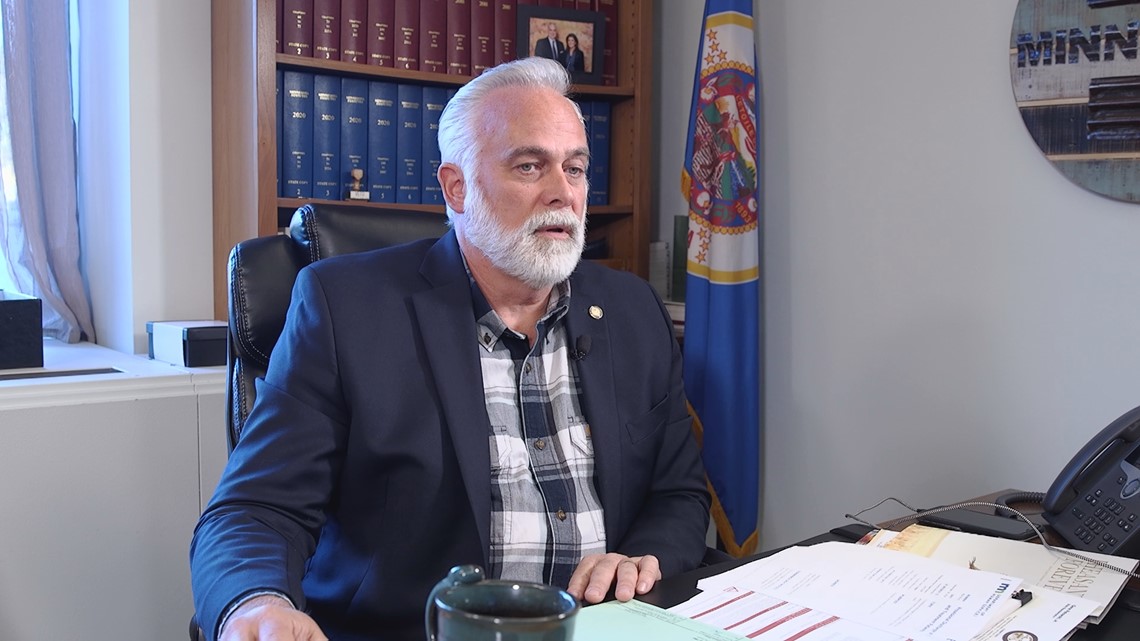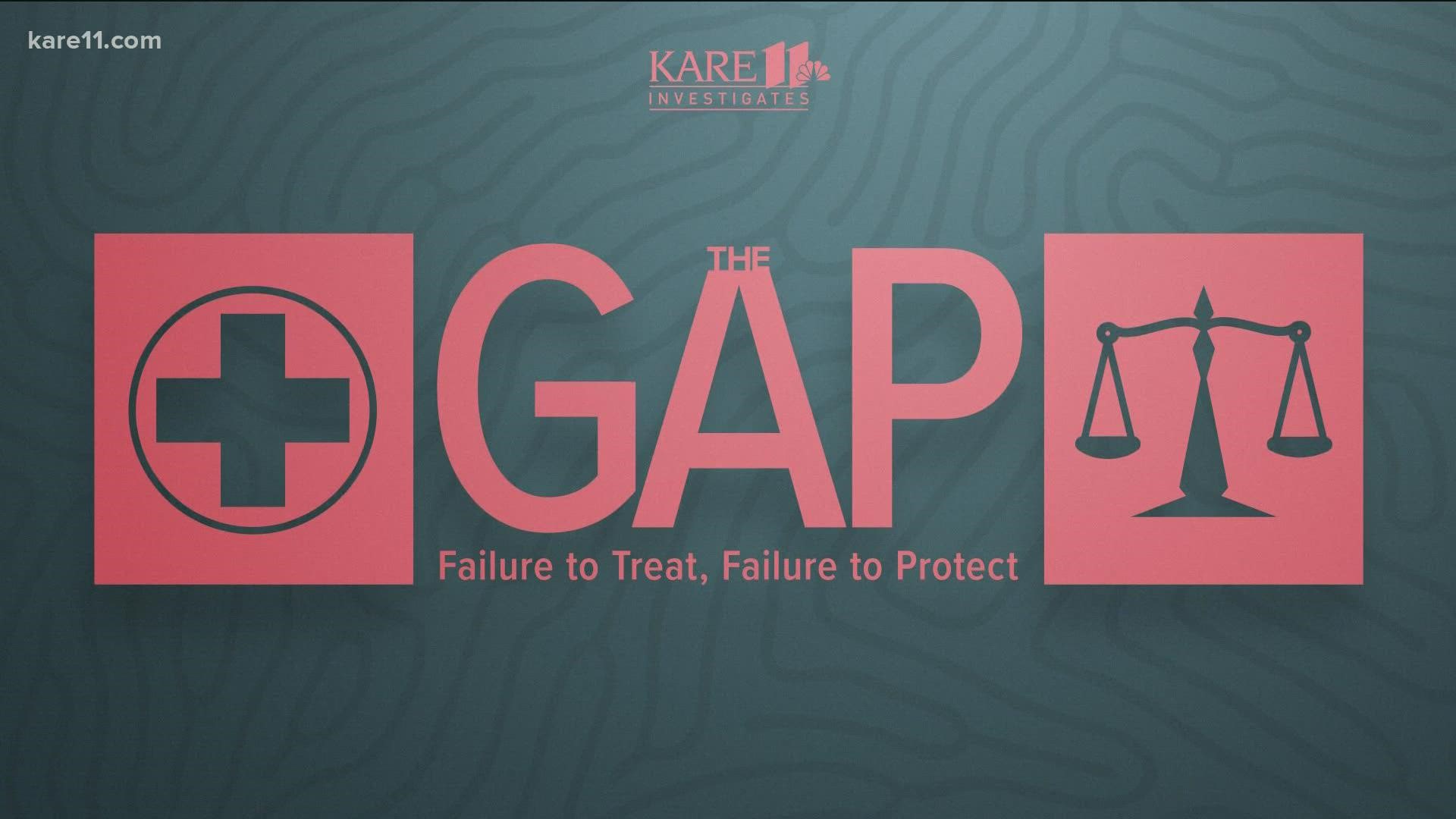ST PAUL, Minn. — A key state lawmaker says he will introduce a bill at the start of next year’s session to reform the state’s criminal justice and mental care systems following massive failures in those safety nets exposed by KARE 11.
For the last several months KARE 11 has reported on what are known in Minnesota as “gap cases,” where suspects charged with crimes and found mentally incompetent to stand trial are released back into the community without the appropriate treatment and supervision, often putting the public’s safety at risk.
KARE 11 has revealed gap cases where severely mentally ill suspects have gone on to be charged with committing brutal assaults, rapes and murders.
KARE 11 has documented four Twin Cities area murders in the past two years in which the alleged killers had been found incompetent to face prior criminal charges but were released back into the community.
“The risk of doing nothing is that we end up with more cases like you’ve reported on, where families are going to be ripped apart,” said Rep. Tony Albright of Prior Lake, the Republican leader of the House Human Services Finance and Policy Committee, who plans to introduce the bill.


Albright joins a growing chorus of state lawmakers calling for reforms, including GOP State Sen. Jim Abeler of Anoka, chair of the Human Services Reform Finance and Policy Committee, who has already held a hearing on the issue.
“We are failing the humanity test. We are failing the protection to the public test,” Abeler previously told KARE 11.
2018 Policy change
Hundreds of those gap cases resulted from a decision made by the Department of Human Services in December 2018 to release mentally incompetent suspects who had been committed to the agency for treatment.
DHS said those releases – called provisional discharges – are of patients considered no longer in need of a hospital care even if they are still not deemed competent to stand trial. The agency said provisional discharges became necessary because the suspects were taking up bed space from those who needed it more.
DHS leadership has said they will not do a provisional discharge without a plan to ensure a suspect’s safety and that of the public.
But as KARE 11 has reported, those releases often are not safe.
Records show DHS has provisionally discharged numerous suspects with violent histories who went on to be charged with new, often horrific crimes.
Among those cases: Terrion Sherman, who was committed to DHS for treatment after being found incompetent to stand trial in armed robbery and assault charges.
DHS provisionally discharged Sherman to a group home, where records show he came and went as he pleased while missing his medication for days and weeks. Then in February last year, Sherman was with his girlfriend when he was accused of brutally murdering her.
Another case involves Omar Isse, whom DHS provisionally discharged last year after he was found incompetent in numerous cases, including second-degree aggravated robbery. Less than two months later after his provisional discharge, he’s accused of raping a woman on a Minneapolis picnic table.
Still incompetent to face criminal charges, Isse was provisionally discharged again, ended up at a Fridley group home, and is accused of attempting to rape a staff member there.
Although it was the second case in which he was charged with sexual assault, a judge released Isse without bond.
In theory he was still under a civil commitment to DHS, but the agency said his whereabouts were unknown. He was missing for more than a month, failing to appear at multiple court hearings.
KARE 11 found him homeless and wandering the streets of south Minneapolis. He was arrested two hours after KARE 11’s first story on him aired.
Calls for change
In response to KARE 11’s reporting, Rep. Brian Johnson of Cambridge said Gov. Tim Walz should take action.
DHS “is putting Minnesotans at high risk by allowing dangerous offenders back on the streets who are supposed to be civilly committed and in DHS custody,” said Johnson, the Republican leader in the House Public Safety and Criminal Justice Reform Finance and Policy Committee.
“The Walz administration needs to take immediate steps to improve communication between DHS and the courts and ensure dangerous individuals aren’t able to walk free, skip court hearings and threaten the safety of the public,” he added.
In a statement, a spokesperson for Gov. Walz responded, "The governor recognizes the need to address any gaps in law that put Minnesotans' health and safety at risk."
The spokesperson pointed to a task force created in 2019, which examined potential solutions on how to restore mentally ill defendants back to competency to stand trial.
"The governor welcomes a conversation with legislators about how best to address these needs, and will continue to look closely at the recommendations put forward by the task force experts in mental health, the courts, and law enforcement," the spokesperson said.
Albright said he based his bill on one introduced to the Minnesota House in 2019 and drafted by the Minnesota County Attorney’s Association. That bill would require a court to determine whether someone found incompetent to stand trial is also a danger to public safety.
If that determination is made, a judge would be required to send a defendant to a secure treatment facility for competency restoration – an authority judges do not currently have in Minnesota.
The county attorney’s bill went nowhere during the 2019 session, failing to even get a hearing.
But Albright hopes his proposal will be more favorably received because it would also create so-called “forensic navigator” positions – a key recommendation of the 2019 task force.
The navigators would help guide mentally incompetent suspects through the court systems in hopes of getting more of them restored to competency to face trial, while also helping them get far better mental health treatment.
“We’re finding in a lot of cases is these individuals don’t have someone that they can rely upon to help them understand their rights, help them understand the process that they’re going through,” he said.
Albright warned the reforms will take money, bipartisan effort and time.
"This is not where you put it into the legislative process and you get a bill signed by the governor and all is good,” he said. “This is probably years of rollout in terms of training, education and ramping up to have this system in place.”

